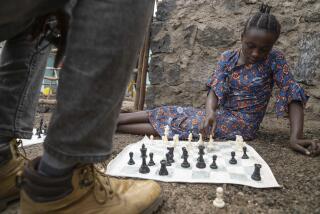Chess Nuts : Teens and Pre-Teens Are Choosing a Game Where Competition Is Keen and Outthinking Your Opponent Is Paramount to Success
- Share via
PLACENTIA — Thoughts of kings and queens filled the heads of Orange County youths last weekend, though they weren’t the kinds of which fairy tales are made.
These particular 43 teens and pre-teens spent three days playing at the second annual National Chess Camp last Friday through Sunday at the Boys Club of Placentia.
“It’s a very highly concentrated training program,” said Robert Snyder, 36, founder and director of the camp. “Kids come out being much better players.”
Co-sponsored by the Boys Club of Placentia and the Chess for Juniors organization, the camp offered matches and workshops for beginning and advanced players.
“Basically, what we do here is provide a nationally rated tournament so the kids can get a national rating,” said Snyder of Garden Grove.
To allow competitors to receive a national rating by the U.S. Chess Federation, the governing body of chess in the country, the tournaments must be run by a certified tournament instructor. In addition to Snyder, the other certified instructors and camp teachers were John Goetze, a fifth-grade teacher from Pear Blossom, Calif., and Cal Olson, a USCF-rated chess expert who owns a glass company in Anaheim.
Snyder began playing chess as a child and attained an “expert” rating at 17 and a “master” rating shortly thereafter. Becoming a “master” player puts one in the top 1% of chess players in the United States, based on the rating system established by the chess federation.
In 1972, Snyder began teaching chess privately and in small groups. As he saw the interest in the game grow among youths, and as their parents learned more about the benefits of the game, Snyder founded the Chess for Juniors club in 1983.
Chess for Juniors in Garden Grove provides an environment for youngsters to learn to play or improve their game. For $30 per month, the 120 club members participate in weekend activities, receive instruction in the game and have access to books, videotapes and computers.
Along with providing a social environment, Snyder said that playing chess “improves logic, concentration and abstract-thinking skills.”
He believes chess to be an excellent outlet for underachievers because the game is so mentally stimulating. “Sometimes kids with a low self-esteem can really get their confidence boosted by learning and playing well.”
As for overachievers, Snyder said, “they find the game endlessly challenging.”
Outside of running lessons and activities for members of Chess for Juniors, Snyder also offers a free chess class for beginners in hopes of sparking an interest in the game. He has also presented assemblies at elementary schools, where Snyder said he has reached more than 50,000 students.
Snyder, who has written a book on teaching chess to children, also has been invited to bring five of his club’s best players to Leningrad, where they will play chess and then tour the Soviet Union. have asked rohwer for a date--lip
Though chess has many merits, many of last weekend’s campers said they most enjoyed the thought process that goes with the game.
Sixth-grader Mark Henderson said he likes to use his brain and that is the best part of playing chess.
“You use your mind in chess and that can be transferred to other things,” said Henderson, an 11-year-old from Irvine. “It helps me improve my grades because my concentration is better.”
Rachel Behen, a seventh-grader from Little Rock, Calif., finished as a co-champion of the camp’s recent tournament with a 5-0 record.
“I like the difficulty. I love to think, so chess challenges me,” Behen said. “I’m learning (in camp) to take my time a lot more, and I’m learning to look at every possibility for every move I make, not just set my mind on one move.”
Ben Swanek, a 17-year-old Tustin High School senior, has participated two consecutive years in chess camp. He said it is the difficulty and challenge of the game that keeps him intrigued.
But the part Swanek enjoys the most? “I like the winning part of the game.”
Swanek, who also finished 5-0 in the camp’s tournament, has been playing chess since he was 6, when he was taught by his father. Last year, he finished first in the Chess for Juniors scholastic tournament.
“Most of my improvement comes from chess lessons and from playing every day after school,” said Swanek, adding that camp has taught him more about opening and closing strategies as well as how to deal with middle-game problems.
He has been a member of Chess for Juniors for four years and says he plays the game almost every day during the school year and nearly as often in the summer.
“I don’t know what I’m going to do with it after I graduate,” he says of his future in chess. However, he did say he wouldn’t be headed in the direction of an expert or master because “those people eat and breathe chess.”
More to Read
Go beyond the scoreboard
Get the latest on L.A.'s teams in the daily Sports Report newsletter.
You may occasionally receive promotional content from the Los Angeles Times.










